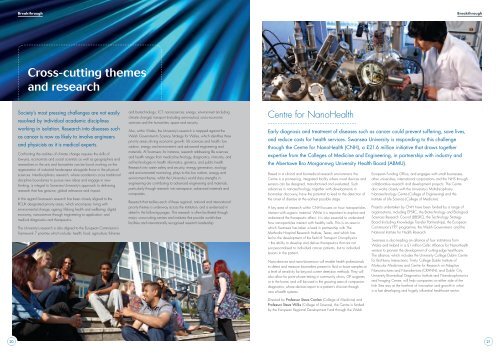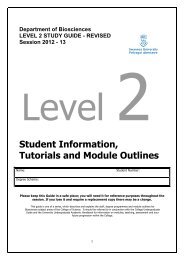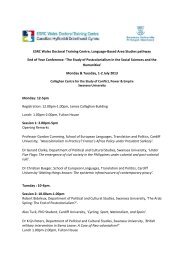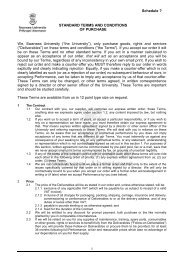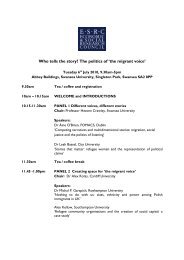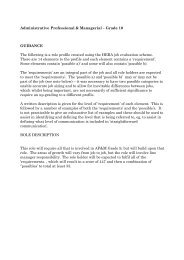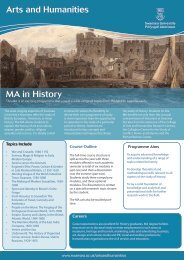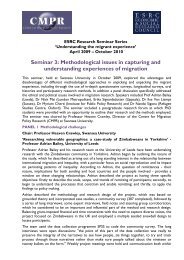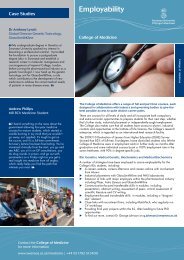Breakthrough 2013 (PDF) - Swansea University
Breakthrough 2013 (PDF) - Swansea University
Breakthrough 2013 (PDF) - Swansea University
Create successful ePaper yourself
Turn your PDF publications into a flip-book with our unique Google optimized e-Paper software.
<strong>Breakthrough</strong><br />
<strong>Breakthrough</strong><br />
Cross-cutting themes<br />
and research<br />
Society’s most pressing challenges are not easily<br />
resolved by individual academic disciplines<br />
working in isolation. Research into diseases such<br />
as cancer is now as likely to involve engineers<br />
and physicists as it is medical experts.<br />
Confronting the realities of climate change requires the skills of<br />
lawyers, economists and social scientists as well as geographers and<br />
researchers in the arts and humanities can be found working on the<br />
regeneration of industrial landscapes alongside those in the physical<br />
sciences. Interdisciplinary research, where academics cross traditional<br />
discipline boundaries to pursue new ideas and engage in new<br />
thinking, is integral to <strong>Swansea</strong> <strong>University</strong>’s approach to delivering<br />
research that has genuine, global relevance and impact.<br />
In this regard <strong>Swansea</strong>’s research has been closely aligned to the<br />
RCUK designated priority areas, which encompass: living with<br />
environmental change; ageing; lifelong health and wellbeing; digital<br />
economy; nanoscience through engineering to application; and<br />
medical diagnostics and therapeutics.<br />
The <strong>University</strong>’s research is also aligned to the European Commission’s<br />
Framework 7 priorities which include: health; food; agriculture; fisheries<br />
and biotechnology; ICT; nanosciences; energy; environment (including<br />
climate change); transport (including aeronautics); socio-economic<br />
sciences and the humanities; space and security.<br />
Also, within Wales, the <strong>University</strong>’s research is mapped against the<br />
Welsh Government’s Science Strategy for Wales, which identifies three<br />
priority areas driving economic growth: life sciences and health; low<br />
carbon, energy and environment; and advanced engineering and<br />
materials. At <strong>Swansea</strong>, for instance, research addressing life sciences<br />
and health ranges from medical technology, diagnostics, immunity, and<br />
cell technologies to health informatics, genetics, and public health.<br />
Research into water safety and security, energy generation, ecology<br />
and environmental monitoring, plays to the low carbon, energy and<br />
environment theme, whilst the <strong>University</strong>’s world-class strengths in<br />
engineering are contributing to advanced engineering and materials,<br />
particularly through research into aerospace, advanced materials and<br />
composites.<br />
Research that tackles each of these regional, national and international<br />
priority themes is underway across the institution, and is evidenced in<br />
detail in the following pages. This research is often facilitated through<br />
major, cross-cutting centres and institutes that provide world-class<br />
facilities and internationally recognised research leadership.<br />
Centre for NanoHealth<br />
Early diagnosis and treatment of diseases such as cancer could prevent suffering, save lives,<br />
and reduce costs for health services. <strong>Swansea</strong> <strong>University</strong> is responding to this challenge<br />
through the Centre for NanoHealth (CNH), a £21.6 million initiative that draws together<br />
expertise from the Colleges of Medicine and Engineering, in partnership with industry and<br />
the Abertawe Bro Morgannwg <strong>University</strong> Health Board (ABMU).<br />
Based in a clinical and biomedical research environment, the<br />
Centre is a pioneering, integrated facility where novel devices and<br />
sensors can be designed, manufactured and evaluated. Such<br />
advances in nanotechnology, together with developments in<br />
biomarker discovery, have the potential to lead to the detection of<br />
the onset of disease at the earliest possible stage.<br />
A key area of research within CNH focuses on how nanoparticles<br />
interact with organic material. Whilst it is important to explore and<br />
understand the therapeutic effect, it is also essential to understand<br />
how nanoparticles interact with healthy cells. This is an area in<br />
which <strong>Swansea</strong> has taken a lead in partnership with The<br />
Methodist Hospital Research Institute, Texas, and which has<br />
led to the development of the field of Transport Oncophysics<br />
– the ability to develop and deliver therapeutics that are not<br />
just personalised to individual cancer patients, but to individual<br />
lesions in the patient.<br />
Nano-devices and nano-biosensors will enable health professionals<br />
to detect and measure biomarkers present in fluid or tissue samples at<br />
a level of sensitivity far beyond current detection methods. They will<br />
also allow for point-of-care testing in community clinics, GP surgeries,<br />
or in the home, and will be used in the growing area of companion<br />
diagnostics, where devices report to a patient’s clinician through<br />
new e-health systems.<br />
Directed by Professor Steve Conlan (College of Medicine) and<br />
Professor Steve Wilks (College of Science), the Centre is funded<br />
by the European Regional Development Fund through the Welsh<br />
European Funding Office, and engages with small businesses,<br />
other universities, international corporations and the NHS through<br />
collaborative research and development projects. The Centre<br />
also works closely with the <strong>University</strong>’s Multidisciplinary<br />
Nanotechnology Centre (College of Engineering) and the<br />
Institute of Life Science (College of Medicine).<br />
Projects undertaken by CNH have been funded by a range of<br />
organisations, including EPSRC, the Biotechnology and Biological<br />
Sciences Research Council (BBSRC), the Technology Strategy<br />
Board (including Knowledge Transfer Partnerships), the European<br />
Commission’s FP7 programme, the Welsh Government, and the<br />
National Institute for Health Research.<br />
<strong>Swansea</strong> is also leading an alliance of four institutions from<br />
Wales and Ireland in a £1 million Celtic Alliance for NanoHealth<br />
venture to pioneer the development of cutting-edge healthcare.<br />
The alliance, which includes the <strong>University</strong> College Dublin Centre<br />
for BioNano Interactions, Trinity College Dublin Institute of<br />
Molecular Medicines and Centre for Research on Adaptive<br />
Nanostructures and Nanodevices (CRANN), and Dublin City<br />
<strong>University</strong> Biomedical Diagnostics Institute and Nanobiophotonics<br />
and Imaging Centre, will help companies on either side of the<br />
Irish Sea stay at the forefront of innovation and growth in what<br />
is a fast developing and hugely influential healthcare sector.<br />
20<br />
21


